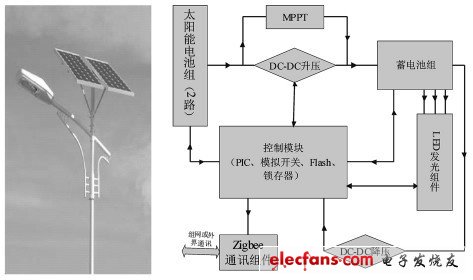Abstract: A new intelligent control LED street light system is proposed. The output voltage of the Solar Panel is passed through the DC/DC boost circuit, and the MPPT control strategy based on the CVT method is introduced. The real-time monitoring and control of the working status of the street lamp system is realized by using the analog switch 4051 and PIC. It also briefly introduces the related applications of Zigbee communication components in the system.
Solar energy is the most direct and most common energy source on the planet, and solar energy is a huge renewable energy source. With the increasing shortage of traditional energy sources, the application of solar energy will become more and more extensive, especially in the field of solar power generation, which has developed into a mature sunrise industry in just a few years.
At present, road lighting accounts for 25% to 30% of the total lighting power consumption, so road lighting energy has great potential and space. At present, the most used road lighting is high-pressure nano lamps, which have the disadvantages of poor color rendering, long startup time, high power consumption, and large heat generation, and need to develop new and more energy-efficient road lighting sources.
High-power high-efficiency LED is a new light source developed rapidly in recent years. It has high luminous efficiency (≥90 lmPW (1W LED)), long life (30000~50000h), resistance to vibration, damage, instant start, no pollution. Etc. White LEDs are an ideal source for general and road lighting. Solar street lights have many advantages: safe and reliable, easy to maintain; do not require conventional energy, do not pollute the environment; can be installed anywhere, need not be connected to the public power grid. Therefore, the development of LED street lights has important energy saving significance. Based on the original solar street light system, this paper proposes and develops a new type of intelligent LED solar street light system.
1 Composition of solar street lighting system
The street light system consists of the following components: solar panels, boost circuit modules, controller modules, Zigbee communication components, battery packs, and LED light sources.
As shown in Figure 1.

Figure 1 The effect diagram and composition block diagram of the street lamp
The basic working principle of the system: Under the control of the solar controller, the solar panel is charged to the battery pack through two boost circuits (12V to 42V) during the day, and the battery pack provides power to the LED lamp load at night. In the control module, the real-time control of the booster circuit, battery voltage, temperature, LED lamp group temperature, and panel voltage is realized, and the data is fed back to the PIC through the analog switch to realize intelligent control of the street lamp system. The Zigbee module provides reliable technical support for the networking of street lighting systems.
1.1 Solar panels
Solar panels are a core part of solar street lights and the most valuable part of solar lights. Its role is to convert the radiant energy of the sun into electrical energy, or send it to the battery for storage. Among the many solar cells, three types are monocrystalline silicon solar cells, polycrystalline silicon solar cells, and amorphous silicon solar cells. In areas where sunlight is abundant, it is better to use polycrystalline silicon solar cells because the production process of polycrystalline silicon solar cells is relatively simple and the price is lower than that of monocrystalline silicon solar cells. In areas with more rainy days and less abundant sunlight, monocrystalline silicon solar cells are preferred because the performance parameters of monocrystalline silicon solar cells are relatively stable. Amorphous silicon solar cells are better in the case of insufficient outdoor sunlight, because amorphous silicon solar cells have lower requirements for solar lighting conditions. In addition, the development of the second generation of solar cells is about to make a breakthrough. The core component is a bondable film, that is, a thin film solar cell material.
1.2 Boost circuit module and its battery pack
In this system, the solar energy collected by the solar panel charges the battery through two DCDC boost circuits. The Boost circuit is built with the LM5022, which utilizes the low-voltage self-locking function of the chip itself to ingeniously realize the control of charging the circuit. Referring to the relationship between the output voltage of the solar cell and the illumination, in the evening (about 18..00 in summer and around 17..00 in winter), the output voltage of the solar cell will be lower than the self-locking voltage of the chip (about 1.25V), passing through the system. The control module stops the system from charging the battery and enters the lighting state.
Portable Solar Charger,Outdoor Folding Solar,Solar Folding Cell,Portable Solar Folding
Shengtian New Energy (Shenzhen)Â Co., Ltd. , https://www.stenergysolar.com